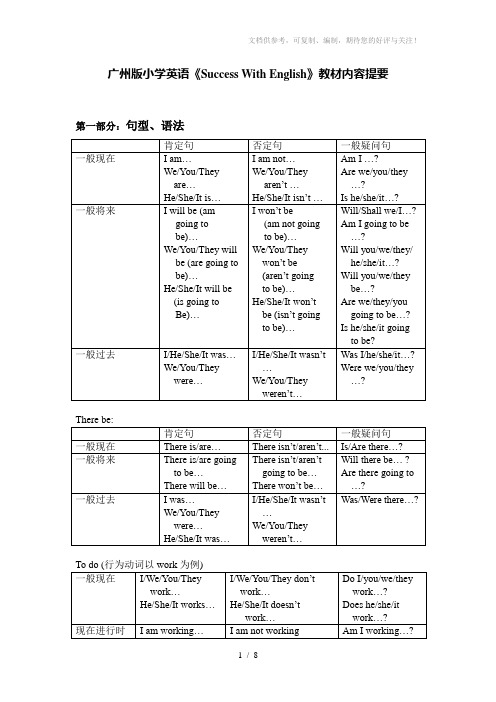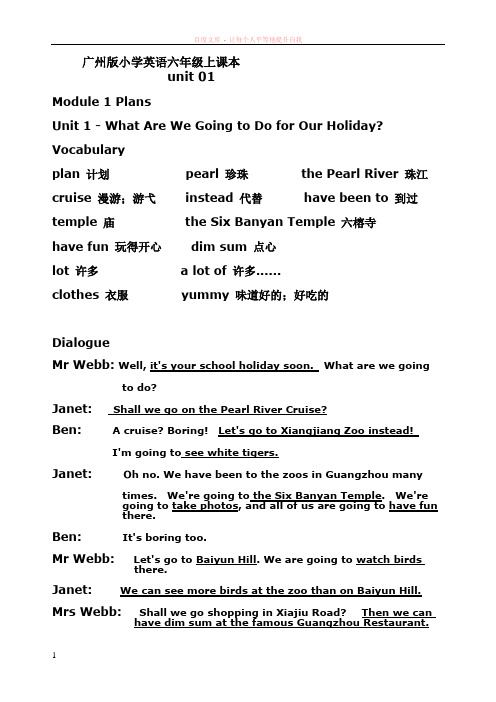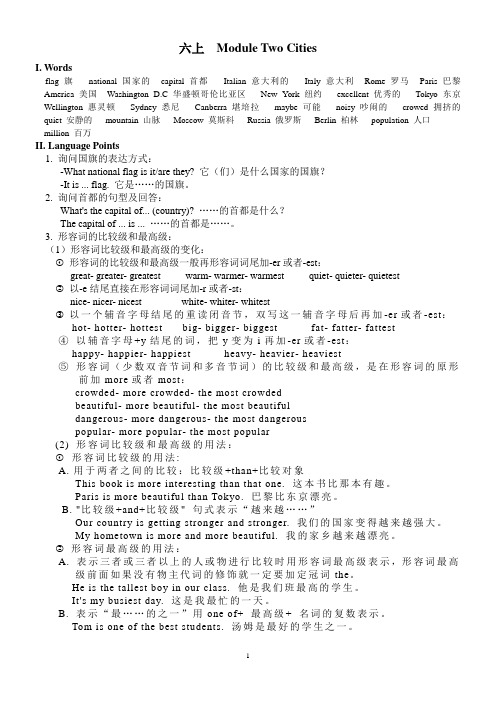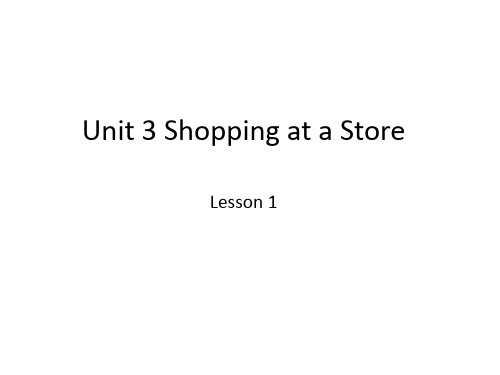广州版英语六年级上册教材
广州版小学英语六年级上册教材内容提要

广州版小学英语《Success With English》教材内容提要第一部分:句型、语法1.读下面的特殊疑问式的句子,你能总结一些特殊疑问句的构成的规律吗?I.Who lives there.Who is singing in the room?Who was at home yesterday?II.What does he do?What is he doing?What did they do?When does he usually get up?When did she have dinner yesterday?Where is he now?Where are they planting trees?Where did they play football?How is your mother?How is he coming?How did they get there?Why does he go there?Why did she go there?III.Whose book is this?Whose parents are coming here?Which book is yours?Which presents did he give you?2. 关于形容词、副词的比较级和最高级(1) 你知道形容词、副词的比较级和最高级构成的一些规律吗?A. 一般情况下加-er, -est:long – longer, longest; small – smaller, smallestB. 重读闭音节,双写最后一个字母再加-er, -est:big – bigger, biggest; hot – hotter, hottestC. 辅音字母加y,改作后一个字母y为i再加-er, -est:funny – funnier, funniest, lucky – luckier, luckiestD. 部分双音节和多音节词,加more, most:slowly – more slowly, most slowly; more delicious, most deliciousE. 不规则变化:good – better, best; bad – worse, worst(2) 你知道形容词、副词的比较级和最高级句子的构成吗?A. This book is newer than that one.The English book is the newest of the three.Mike runs faster than John.Mike runs fastest in his class.B. This flower is more beautiful than that one.This tree is the oldest in the park.The girl is swimming better than the girl.Jim swims best in his group.C. Snakes are more dangerous than frogs.The meeting is the most important.The old man walks more slowly the young man.Kate jumps highest in her class.D. Tim has more books than Jim.Tim has the most stamps in his class.3. 关于代词some-, any-, no-, every-:(1) some- 多用在肯定句表示请求得到某些东西的句子:Someone will come here.Would you like something to eat.(2) any- 多用于疑问句或否定句:Is there anything in the box?We don’t want to see anyone of them?(3) no- 是事实的否定:There is nothing in the room.Nobody can do that.(4) 代词some-, any-, no-, every- 语法上看成是第三人称单数:There is something in the bottle.Everyone likes it.表1:小学教材各话题板块涉及的主要内容表2:小学教材话题分配表2:小学教材动词分类日常作息:wake up get up get dressed wash the face brush the teeth have breakfast go to school go to workhave lessons have lunch take a rest play sportstake exercises go (back) home have dinner do homeworkhave a bath go to bed sleep eat drinkcook娱乐休闲:have a party have a picnic do some reading do shopping go shopping go boating go swimming go sightseeinggo fishing go traveling go on a river cruise go to the circusgo to the flower show go to the cinema go to a football matchwatch a football match on TV come to tea see a filmwatch the birds listen to music / the radio watch TVclimb the mountain play cards e-mail a friend write a lettervisit a friend / Beijing meet a friend爱好与特长:sing draw paint play the piano / the guitar do well in …make a ship model play cards play chess体育运动:run swim skip rope swim play basketball play football play table tennis play tennis play badminton do weight-lifting家务:water the flowers do gardening plant trees / flowers clean the house sweep the floor wash the dishes cook wash the car wash clothes feed the pet学习:read listen speak write study learn practice hand in the homework borrow a book return a book catch up with teach mark the homework prepare the lessons tell a story心理和情感活动:want love enjoy like dislike love prefer hope wish agree with think dream feel sad /happy /excited /boredworry身体健康:take exercise see a doctor take the medicine go on a diet have a cold / fever / toothache / headache feel tired /hot /cold /ill /sickeat drink感官动词:listen to hear look at see watchfeel hot / cold /tired sound interesting / different / greatlook young / tall / beautiful /fresh /good种植活动:grow / plant a tree grow / plant flowers water the flowers dig a hole fill in the earth pick up the fruit appear位置移动:leave leave for start for move bring take climb run walk swim jump fly sit down standup throw … at …travel go comeget to…get out of…get down fall fall over与职业有关的动词:work put out fires clean up everything deliver letterscatch criminals serve food and drinks help in a shopdrive a taxi / an ambulance check your teeth help us to learnhelp sick people与“说”有关的动词:say speak talk tell与“看”有关的动作:look look at look for watch see其它动词:last begin start end finish bite blow blow out buy call carry catch change check close open count cost cover crash cut decorate free change give grow / grow up help invite get wet kill keep look for make need put on put out show turn wait for run into crash into weighhavehave a rest have a bath have a cold have a good time have been to… have a look have fun have totaketake a message take a rest take medicine take exercise take photos take a bus take me to the flower show take the third left I’ll take it.playplay computer games play cards play basketball play musical instrumentsplay the piano。
广州版小学英语六年级上教材

广州版小学英语六年级上课本unit 01Module 1 PlansUnit 1 - What Are We Going to Do for Our Holiday? Vocabularyplan 计划pearl 珍珠the Pearl River 珠江cruise 漫游;游弋instead 代替have been to 到过temple 庙the Six Banyan Temple 六榕寺have fun 玩得开心dim sum 点心lot 许多 a lot of 许多......clothes 衣服yummy 味道好的;好吃的DialogueMr Webb: Well, it's your school holiday soon. What are we going to do?Janet: Shall we go on the Pearl River Cruise?Ben: A cruise? Boring! Let's go to Xiangjiang Zoo instead!I'm going to see white tigers.Janet: Oh no. We have been to the zoos in Guangzhou many times. We're going to the Six Banyan Temple. We'regoing to take photos, and all of us are going to have funthere.Ben: It's boring too.Mr Webb:Let's go to Baiyun Hill. We are going to watch birdsthere.Janet: We can see more birds at the zoo than on Baiyun Hill. Mrs Webb:Shall we go shopping in Xiajiu Road? Then we can have dim sum at the famous Guangzhou Restaurant.Janet:Good idea! I want to buy some new clothes. There area lot of beautiful clothes there.Ben:Great! I like Guangdong dim sum. Yummy, yummy!unit 02Unit 2 What Shall We Do?go fishing 去钓鱼love 爱stupid 愚蠢的on 上演tonight 今晚;在今晚king 国王DialogueJanet: What are you going to do on Thursday morning, Xiaoling? Xiaoling: Mmm...let me see. I'm not going to do anything. Why? Janet: My family are going fishing. Would you like to go with us? Xiaoling: I'd love to, thanks a lot. When are you going to start? Janet: We are going to leave our house at half past eight. Why don't you come to our house at twenty past eight? Xiaoling:Great! I'll see you then! 到时候见!Jiamin: Are you going to watch the footfall game on TVtomorrow evening, Ben?Ben:Yes, we are. I'm going to watch it together with Mike and Yongxian.Jiamin: My family are watching a stupid film when the football game is on. So I can't watch it.Ben: Why don't you come to my house to watch it? We're going to have dinner before the game. You can eat with us too. Jiamin: Thanks. Ben. I'll ask my parents.Xiaolin: Janet, do you want to play table tennis with me tonight? Janet: I'm sorry, I can't. I'm going to do my homework. Xiaoling: What about tomorrow night?Janet: I'm sorry, I can't. I'm going swimming with my parents. Xiaoling: What about Saturday night?Janet: To tell you the truth, I don't like playing table tennis. I'm going to the cinema with Ben tonight! 去看电影Sally: What film are you going to see?Janet: The Lion King.Sally: Can I go with you?Janet: Yes, of course. But you'd better ask your parents first.unit 04Module Two CITIESUnit Four - I Know This City!flag 旗national 国家的;民族的national flag 国旗capital 首都Italian 意大利的;意大利语;意大利人Italy 意大利Rome 罗马Paris 巴黎America 美国;美洲Washington D.C. 华盛顿哥伦比亚区New York 纽约excellent 极好的;优秀Tokyo 东京Wellington 惠灵顿Sydney 悉尼Canberra 堪培拉prefer to 宁愿,更喜欢fantastic [fæn'tæstɪk] adj. 奇异的;极好的;不可思议的DialogueLook and listen. Then read and act扮演in groups.分小组Mr Chen:Boys and girls同学们, look at this flag please. Whatnational flag is it?Ben: Easy! It's the Chinese national flag.Mr Chen: Good. What's the capital of China?Ben:That's easy too. The capital of China is Beijing.Mr Chen:Very good. Look at these three flags. What national flags are they?Janet:That's the national flag of the UK英国. The capital of the UK is London.Xiaoling: That is the Italian national flag.Mr Chen: What's the capital city of Italy, do you know? Yongxian: I know, Mr Chen. It's Rome.Janet: And that's the French national flag. The capital of France is Paris.Mr Chen:Excellent! 太棒子!What about this one?Jiamin: That's the American national flag. New York is the capital of America.Sally: No. The capital of the USA is Washington D.C..New York is the biggest city of the USA.Mr Chen:Fantastic! 了不起!Look at this flag. What flag is it, Janet?Janet: It's the national flag of Australia?Mr Chen: What's the capital of Australia?Janet: Sydney.Mr Chen: No. Sydney is the largest city of Australia. Thecapital of Australia is Canberra.unit 05Unit 5 Where Would They Like to Go On Holiday?maybe 可能noisy 吵闹的crowded 拥挤的quiet 安静的just 仅仅;正;恰好;刚Moscow 莫斯科Russia 俄罗斯Berlin 柏林the Great Wall 长城mountain 山;山脉population 人口million 百万DialogueMr Webb: Children, where would you like to go on holiday (去度假)this summer?Ben:I'd like to go to Japan.Mrs Webb: Tokyo. Yes, Tokyo is a good place to visit. 东京是一个旅游的好地方。
广州版英语六年级上册《Christmas》1

1、Christmas Day falls on 25December.People put up a Christmas tree in their home. They put presents for family and friends under the Christmas tree.
圣诞节在每年的12月25.
Chrisather Christmas
December 25th
It’s Christmas Day.
Christmas tree
stocking
present
Christmas card
computer
bike
robot
open
打开
Let’s listen and say.
3、People send Christmas cards to their friends to wish them a “Merry Christmas”.
人们发送圣诞贺卡给朋友们 ,祝愿他们圣诞快乐。
4、People buy a lot of things for Christmas. In big shopping centers, Father Christmas gives gifts to children.
人们在家里装饰圣诞树。
他们在圣诞树下为亲人和朋友准备 圣诞礼物。
It’s Christmas again! I can’t wait to open my
presents.
圣诞节又来了! 我迫不及待地想 打开我的礼物。
你可以在圣诞 节那天打开它 。
You can open it on Christmas
在圣诞节的时候人们买很多东西 。
小学英语广州版六上 Module Two Cities教材

六上Module Two CitiesI. W ordsflag 旗national 国家的capital 首都Italian 意大利的Italy 意大利Rome 罗马Paris 巴黎America 美国Washington D.C 华盛顿哥伦比亚区New Y ork 纽约excellent 优秀的Tokyo 东京Wellington 惠灵顿Sydney 悉尼Canberra 堪培拉maybe 可能noisy 吵闹的crowed 拥挤的quiet 安静的mountain 山脉Moscow 莫斯科Russia 俄罗斯Berlin 柏林population 人口million 百万II. Language Points1. 询问国旗的表达方式:-What national flag is it/are they? 它(们)是什么国家的国旗?-It is ... flag. 它是……的国旗。
2. 询问首都的句型及回答:What's the capital of... (country)? ……的首都是什么?The capital of ... is ... ……的首都是……。
3. 形容词的比较级和最高级:(1)形容词比较级和最高级的变化:①形容词的比较级和最高级一般再形容词词尾加-er或者-est:great- greater- greatest warm- warmer- warmest quiet- quieter- quietest②以-e结尾直接在形容词词尾加-r或者-st:nice- nicer- nicest white- whiter- whitest③以一个辅音字母结尾的重读闭音节,双写这一辅音字母后再加-er或者-est:ho t- ho tter- hottest b ig- b igger- b ig gest fat- fatter- fattest④以辅音字母+y结尾的词,把y变为i再加-er或者-est:hap p y- hap p ier- hap p iest heavy- heavier- heaviest⑤形容词(少数双音节词和多音节词)的比较级和最高级,是在形容词的原形前加mo re或者mo st:cro wded- mo re cro wded- the mo st cro wdedb eautifu l- mo re beautiful- the mo st b eautifu ld angero us- mo re dangero us- the mo st d angero usp op ular- mo re po p ular- the mo st p op ular(2) 形容词比较级和最高级的用法:①形容词比较级的用法:A.用于两者之间的比较:比较级+than+比较对象This boo k is more interesting than that o ne.这本书比那本有趣。
小学英语六年级上册(广州版) Unit 3 Shopping at a Store课件

B. Work in groups. “Ask and Report”
1. Fill in the table using the dialog below. A: Which do you like better, English or math ? B: I like English better.
1. -Can I try this shirt on? -Of course. 2. -Dad, I like those pants. -Let's go into the shop. 3. The fitting room is over there.
E. Read and write the correct letter.
Which do you like better, English or math? I like English better.
Which do you like better, pears or oranges? I like pears better.
-This…is too…for me. Do you have a…one? -Sure! This is the…one. / Sorry, that is the…one.
Xiaoxiao: Can I try this shirt on? Salesperson: Of course. The fitting room is over there.
Talk Together
-Which do you like better,…or…? -I like…better.
2. Make the graph with the ansat a Store
Lesson 2
广州教科版六年级上册英语Module6课件PPT (2)

请在此粘贴或者输入您的文字内容请在此粘贴或者输入您的文字内容
请在此粘贴或者输入您的文字内容请在此粘贴或者输入您的文字内容
教学过程
输入 标题
输入 标题
输入 标题
输入 标题
输入 标题
输入 标题
请在这里输入您 的主要叙述内容
请在这里输入您 的主要叙述内容
请在这里输入您 的主要叙述内容
您的内容打在这里,或者通过复制您的文本后,在此框中选择粘贴,并选择只保留文字。您的内容打在这里,或者通过复制您的文本后,在此框中
教学分析
添加文本
1
3
2
4
单击添加内容单击添加内容单击添加内容单击添加内容单击添加内容单击添加内容单击添加内容
单击添加内容单击添加内容单击添加内容单击添加内容单击添加内容
单击添加内容单击添加内容单击添加内容单击添加内容单击添加内容
clean the room
Let’s learn!
make dumplings
Let’s learn!
visit family and friends
What do you do for the Spring Festival?
Pairwork
I paste Spring Festival couplets.
单击此处添加说明文字单击此处添加说明文字单击此处添加说明文字单击此处添加说明文字单击此处单击此处添加说明文字。
教学策略
输入内容:
添加小标题:
您的内容打在这里,或者通过复制您的文本后,并选择只保留文字。
添加小标题:
您的内容打在这里,或者通过复制您的文本后,并选择只保留文字。
教学策略
添加标题
广州版英语六年级上册教材
广州版六年级上册教材目录Unit 1 What are those farmers doing? (5)➢词汇 (5)➢重点短语 (6)➢重点句型 (6)➢课文翻译 (7)➢知识点解析 (8)➢Unit1习题 (16)➢Unit1习题答案 (19)Unit 2 A country life is a healthy life (20)➢词汇 (20)➢重点短语 (21)➢重点句型 (22)➢课文翻译 (22)➢知识点解析 (23)➢Unit2习题 (27)➢Unit2习题答案 (30)Unit 3 Where are you from? (31)➢词汇 (31)➢重点短语 (32)➢句型 (32)➢课文翻译 (32)➢知识点解析 (33)➢Unit3习题 (40)➢Unit3习题答案 (44)Unit 4 I like the city very much (44)➢词汇 (44)➢重点短语 (45)➢重点句型 (46)➢知识点解析 (47)➢Unit4习题 (51)➢Unit4习题答案 (54)Unit 5 What’s the matter with you? (55)➢词汇 (55)➢重点短语 (56)➢重点句型 (57)➢课文翻译 (57)➢知识点解析 (58)➢Unit5习题 (67)➢Unit5习题答案 (70)Unit 6 The secret to good health (71)➢词汇 (71)➢重点词组 (71)➢重点句型 (72)➢课文翻译 (72)➢知识点解析 (73)➢Unit6习题 (83)➢Unit6习题答案 (86)Unit 7 What did you do yesterday? (88)➢词汇 (88)➢重点语法 (88)➢重点句型 (89)➢课文翻译 (89)➢知识点解析 (90)➢重点语法:一般过去时 (90)➢Unit7习题 (97)➢Unit7习题答案 (101)Unit 8 A trip to Hong Kong (102)➢重点短语 (102)➢重点句型 (103)➢课文翻译 (103)➢知识点解析 (103)➢重点语法:一般过去时 (110)➢Unit8习题 (114)➢Unit8习题答案 (118)Unit 9 Was I a good girl back then? (119)➢词汇 (119)➢重点短语 (119)➢重点句型 (120)➢课文翻译 (120)➢知识点解析 (120)➢重点语法:一般过去时 (123)➢Unit9习题 (125)➢Unit9习题答案 (128)Unit 10 Then and now (129)➢词汇 (129)➢重点短语 (129)➢重点句型 (129)➢课文翻译 (130)➢知识点解析 (130)➢Unit10习题 (137)➢Unit10习题答案 (140)Unit 11 I like the Spring Festival best (141)词汇 (141)➢重点短语 (141)➢重点句型 (142)➢知识点解析 (143)➢Unit11习题 (149)➢Unit11习题答案 (153)Unit 12 Christmas (155)➢词汇 (155)➢重点句型 (155)➢课文翻译 (155)➢知识点解析 (156)➢Unit12习题 (162)➢Unit12习题答案 (165)Unit 1 What are those farmers doing? ➢词汇➢重点短语feed the chickens and ducks 喂养鸡和鸭子feed the pigs 喂猪feed the horse 喂马grow flowers and vegetables 种花和蔬菜plant trees 种树cut grass 割草any other 任何一个on the farm 在农场里milk the cow 挤奶➢重点句型1.What are those farmers doing? They’re cutting grass to feed the animals.2.What do you grow on your farm?3.We have a few goats and pigs.4.There are fruit trees in this field.5.There is a cow on the farm.➢课文翻译Ben: What do you grow on your farm, Uncle Chen?Uncle Chen: So many things. There are fruit trees in this field. You can pick some apples or oranges from the trees if you want. They are delicious. And in that field we grow rice. Ben: What are those farmers doing?Uncle Chen: They are cutting grass to feed other animals. We give it to the cows and sheep.Ben: Do you have any other animals on the farm?Uncle Chen: Oh yes. We have a few goats and pigs. And we also have some geese. Ben: I see them on the river. They look lovely.Ben:陈叔叔,你在农场种什么?Uncle Chen:种很多的东西。
广州六年级英语上册Unit 8 A Trip to Hong Kong
Module 4 Past Experiences
1st Period
trip:旅游
One years ago, I went on a trip to Hong Kong
知识点: go on a trip to… 去….旅游
e.g. My mother and I went on a trip to Shenzhen last winter.
take a photo with sb. 和某人一起照相;
We played lots of different games.
知识点:lots of = a lot of = plenty of + 可数名词复 数、不可数名词 (大量的)
e.g. Mum bought me lots of ( a lot of/ plenty of ) lovely toys.
took a photo with Mickey Mouse and Donald Duck ____ __________ __________. played lots of different games. _____
had hamburgers and chips _______. for lunch ____
Jiamin had a seven-day holiday. So last weekend Jiamin and his mother, Ben went on a trip to Hong Kong.
travelled to
ቤተ መጻሕፍቲ ባይዱ
Ben said he was very excited
excited:兴奋的,(形容人) exciting:兴奋的,(形容物)
最新教科版六年级英语上册(广州版)全册完整课件
Unit 6 The secret of good health
最新教科版六年级英语上册(广州 版)全册完整课件
Unit 4 I like the city very much
最新教科版六年级英语上册(广州 版)全册完整课件
Module 3 Health
最新教科版六年级英语上册(广州 版)全册完整课件
Unit 5 What’s the matter with you?
最新教科版六年级英语92页 0133页 0181页 0183页 0185页 0228页 0264页 0322页
Module 1 Country life Unit 2 A country life is a healthy life Unit 3 Where are you from? Module 3 Health Unit 6 The secret of good health Unit 7 What did you do yesterday? Module 5 Changes Unit 10 Then and now Unit 11 I like the Spring Festival best Module 7 Let's look back
最新教科版六年级英语上册(广州 版)全册完整课件
Module 2 City life
最新教科版六年级英语上册(广州 版)全册完整课件
Unit 3 Where are you from?
最新教科版六年级英语上册(广州 版)全册完整课件
Module 1 Country life
最新教科版六年级英语上册(广州 版)全册完整课件
Unit 1 What are those farmers doing?
广州版六年级英语上册PPT课件
广州版六年级英语上册PPT课件《Christmas》MP3音频课件文件内包含本课教学使用的MP3音频文件,非常适用于本课教学。
关键词:广州版六年级上册英语MP3音频课件免费下载,《Christmas》音频下载,.mp3格式;...•《Christmas》PPT课件第一部分内容:圣诞节的由来 The wordChristmasis a bination of the words ChristandMass。
Christmas这个词是基督和弥撒的缩写,弥撒是教会的一种礼拜仪式。
耶诞节是一个宗教节日,世人把它当作耶稣的诞辰来庆祝,因而又名耶诞节...•《Christmas》PPT 第一部分内容:Lets listen and say.1、Christmas Day falls on 25December.People put up a Christmas tree in their home. They put presents for family and friends under the Christmas tree. 圣诞节在每年的12月25. 人们在家里装饰...•《I like the Spring Festival best》PPT课件第一部分内容:Lets guess . Jiamin had a wondeful Spring Festival last year. Guess what he did during the last Spring Festival? Maybe he ... Lets talk . A: What did Jiamin do during the last Spring...•《I like the Spring Festival best》PPT 第一部分内容:Brainstorm What festivals do you know? Dragon Boat Festival dragon boat races the Spring Festival Chongyang Festival Mid-autumn Festival ... ... ... 《I like the Spring Festival best》PP...•《Then and now》MP3音频课件文件内包含本课教学使用的MP3音频文件,非常适用于本课教学。
- 1、下载文档前请自行甄别文档内容的完整性,平台不提供额外的编辑、内容补充、找答案等附加服务。
- 2、"仅部分预览"的文档,不可在线预览部分如存在完整性等问题,可反馈申请退款(可完整预览的文档不适用该条件!)。
- 3、如文档侵犯您的权益,请联系客服反馈,我们会尽快为您处理(人工客服工作时间:9:00-18:30)。
广州版六年级上册教材目录Unit 1 What are those farmers doing? (5)➢词汇 (5)➢重点短语 (5)➢重点句型 (6)➢课文翻译 (7)➢知识点解析 (8)➢Unit1习题 (16)➢Unit1习题答案 (19)Unit 2 A country life is a healthy life (20)➢词汇 (20)➢重点短语 (21)➢重点句型 (22)➢课文翻译 (22)➢知识点解析 (23)➢Unit2习题 (27)➢Unit2习题答案 (30)Unit 3 Where are you from? (31)➢词汇 (31)➢重点短语 (32)➢句型 (32)➢课文翻译 (32)➢知识点解析 (33)➢Unit3习题 (40)➢Unit3习题答案 (44)Unit 4 I like the city very much (44)➢词汇 (44)➢重点短语 (45)➢重点句型 (46)➢知识点解析 (47)➢Unit4习题 (51)➢Unit4习题答案 (54)Unit 5 What’s the matter with you? (55)➢词汇 (55)➢重点短语 (56)➢重点句型 (57)➢课文翻译 (57)➢知识点解析 (58)➢Unit5习题 (67)➢Unit5习题答案 (70)Unit 6 The secret to good health (71)➢词汇 (71)➢重点词组 (71)➢重点句型 (72)➢课文翻译 (72)➢知识点解析 (73)➢Unit6习题 (83)➢Unit6习题答案 (86)Unit 7 What did you do yesterday? (88)➢词汇 (88)➢重点语法 (89)➢重点句型 (89)➢课文翻译 (90)➢知识点解析 (90)➢重点语法:一般过去时 (91)➢Unit7习题 (97)➢Unit7习题答案 (101)Unit 8 A trip to Hong Kong (102)➢重点短语 (103)➢重点句型 (103)➢课文翻译 (103)➢知识点解析 (104)➢重点语法:一般过去时 (110)➢Unit8习题 (115)➢Unit8习题答案 (118)Unit 9 Was I a good girl back then? (119)➢词汇 (119)➢重点短语 (120)➢重点句型 (120)➢课文翻译 (120)➢知识点解析 (121)➢重点语法:一般过去时 (124)➢Unit9习题 (126)➢Unit9习题答案 (128)Unit 10 Then and now (129)➢词汇 (129)➢重点短语 (130)➢重点句型 (130)➢课文翻译 (130)➢知识点解析 (131)➢Unit10习题 (138)➢Unit10习题答案 (141)Unit 11 I like the Spring Festival best (142)词汇 (142)➢重点短语 (142)➢重点句型 (143)➢知识点解析 (144)➢Unit11习题 (150)➢Unit11习题答案 (154)Unit 12 Christmas (156)➢词汇 (156)➢重点句型 (156)➢课文翻译 (156)➢知识点解析 (157)➢Unit12习题 (163)➢Unit12习题答案 (166)Unit 1 What are those farmers doing? ➢词汇➢重点短语feed the chickens and ducks 喂养鸡和鸭子feed the pigs 喂猪feed the horse 喂马grow flowers and vegetables 种花和蔬菜plant trees 种树cut grass 割草any other 任何一个on the farm 在农场里milk the cow 挤奶➢重点句型1.What are those farmers doing? They’re cutting grass to feed the animals.2.What do you grow on your farm?3.We have a few goats and pigs.4.There are fruit trees in this field.5.There is a cow on the farm.➢课文翻译Ben: What do you grow on your farm, Uncle Chen?Uncle Chen: So many things. There are fruit trees in this field. You can pick some apples or oranges from the trees if you want. They are delicious. And in that field we grow rice. Ben: What are those farmers doing?Uncle Chen: They are cutting grass to feed other animals. We give it to the cows and sheep.Ben: Do you have any other animals on the farm?Uncle Chen: Oh yes. We have a few goats and pigs. And we also have some geese. Ben: I see them on the river. They look lovely.Ben:陈叔叔,你在农场种什么?Uncle Chen:种很多的东西。
这片田野里有果树。
如果你愿意,你可以从树上摘些苹果或桔子。
它们的味道真好!在那片土地上我们种水稻。
Ben:那些农民在干什么?Uncle Chen:他们割草喂其他动物。
我们把它给了牛和羊吃。
Ben:农场里还有其他的动物吗?Uncle Chen:是的。
我们有几只山羊和猪。
我们还有一些鹅。
Ben:我在河上看见他们了。
它们看起来很可爱。
➢知识点解析【知识点一】我们先来看一下本节课有哪些新单词及短语【知识点二】可数/不可数名词可数名词一般来说个体名词和集体名词可以用数目来计算,称为可数名词。
可数名词有单数和复数两种形式。
例如: a book, two books, a student, three students, a family, many families。
名词单数变复数变化如下:◆词尾直接加s如:cat——cats bag——bags day——days◆以s, sh, ch, x 结尾的词加es如:class——classes, match——matches ,box----- boxes, dish ---- dishes, bus --- buses, peach --- peaches .◆以辅音加y结尾的词变y为i加es. 元音加y 结尾的词直接加s,如: party----parties city----cities story----stories family---families baby --- babiesboy---- toys monkey----- monkeys key---- keys等.◆以f或fe结尾的词, 变f或fe 为v, 加es,如: wife ---- wives, half---- halves, shelf—shelves, knife --- knives, life---lives, leaf---leaves.注意特殊情况直接加“s”,要逐个记chiefs, handkerchiefs , roofs.◆以辅音加o 结尾的词:有生命的加es如: tomatoes, potatoes, heroes.无生命的如s,如::radios, zoos, pianos, photos◆名词单数变复数特殊变化也要逐个记得如: man-men, woman-women, policeman-policemen, tooth---teeth, foot---feet, child--children,mouse-mice,goose---geese.(注意:以下单复同形:deer, sheep, species, means, Chinese, Japanese)练一练:一、请写出下列词的复数形式。
1.tooth ___________2.deer___________ _3.boy____________4.bus______________5.man ___________6.woman ___________7.child __________ 8.watch_________ 9.diary____________10. sheep___________11.box___________ 12.people___________二、选择题。
( )1.The deer has four ______.A. footB. feetC. feetsD. foots( )2.Her two brothers are both ______.A. policemanB. policemansC. policemenD. policemens( )3.Two ______ would come to the village.A. woman-doctorsB. women doctorC. women doctorsD. woman doctors( )4.Can you see nine _____ in the picture?A. sheepB. dogC. pigD. horse( )5..I saw many _____ in the street.A. peoplesB. peopleC. people’sD. peoples’( )6.The boy often brushes his _____ before he goes to bed.A. toothB. toothsC. teethD. teeths( )7.Tom’s uncle has fifty on his farmA. sheepB.sheepsC.sheepes不可数名词不可数名词不能用数字计算包括物质名词( air, water等)及抽象名词(advice, hate)等。
所以它通常只有单数形式。
如:English, air, water, cotton, work…不可数名词的类别:食物:food ,salt, bread, rice, beef, meat, pork, butter(黄油),cream.液体:water, juice, milk, coffee, tea, coke, oil, wine.表示自然现象:snow, ice ,rain, air.其他类:money,homework, housework, time, music, weather注意事项:1.数量的表达方式不可数名词后面不可以加s, 前面不能直接加数字,不能用a或an,常用some,much,a little,a lot of,plenty of表示多少。
